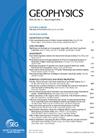从主动源和被动源表面波数据中提取多模态瑞利波频散谱的频率-汉克尔变换方法
IF 3.2
2区 地球科学
Q1 GEOCHEMISTRY & GEOPHYSICS
引用次数: 0
摘要
雷利波频散能谱已被广泛用于提取频散曲线和反演地下剪切波速度结构,用于工程地球物理和地震学。我们提出了一种频率-汉克尔(F-H)变换方法,用于从主动源和被动源瑞利波数据中提取高质量的多模态瑞利波频散能谱。F-H 变换方法受到频率-贝塞尔(F-J)变换方法的启发,并考虑了用于瑞利波频散分析的格林斯函数的物理意义。与 F-J 变换法相比,F-H 变换法可以自然地避免 F-J 频谱图上的会聚波造成的交叉伪影,并能以更少的瑞利波数据获得更多相同质量的多模态频散谱。为了证明 F-H 变换方法的有效性、准确性和适用性,我们使用了近地表勘探和环境噪声层析成像中主动源和被动源的合成和现场雷利波数据。F-H 变换方法统一了 F-J 变换方法及其对主动源和被动源雷利波数据的修改。F-H 变换法是一种稳健、高效的多模态瑞利波频散分析方法,适用于主动源和被动源瑞利波数据。本文章由计算机程序翻译,如有差异,请以英文原文为准。
A frequency-Hankel transform method to extract multimodal Rayleigh wave dispersion spectra from active and passive source surface wave data
Rayleigh wave dispersion energy spectra have been widely used to extract dispersion curves and invert for underground shear-wave velocity structures for engineering geophysics and seismology. We propose a frequency-Hankel (F-H) transform method to extract high-quality multimodal Rayleigh wave dispersion energy spectra from active and passive source Rayleigh wave data. The F-H transform method is inspired by the frequency-Bessel (F-J) transform method and considers the physical meaning of Greens functions for Rayleigh wave dispersion analysis. The F-H transform method can naturally avoid crossed artefacts caused by converging waves on F-J spectrograms and obtains more multimodal dispersion spectra of the same quality with fewer Rayleigh wave data than the F-J transform method. Both synthetic and field Rayleigh wave data from active and passive sources for near-surface exploration and ambient noise tomography are used to demonstrate the validity, accuracy and applicability of the F-H transform method. The F-H transform method unifies the F-J transform method and its modifications for active and passive sources Rayleigh wave data. The F-H transform method is a robust and efficient multimodal Rayleigh wave dispersion analysis method for active and passive source Rayleigh wave data.
求助全文
通过发布文献求助,成功后即可免费获取论文全文。
去求助
来源期刊

Geophysics
地学-地球化学与地球物理
CiteScore
6.90
自引率
18.20%
发文量
354
审稿时长
3 months
期刊介绍:
Geophysics, published by the Society of Exploration Geophysicists since 1936, is an archival journal encompassing all aspects of research, exploration, and education in applied geophysics.
Geophysics articles, generally more than 275 per year in six issues, cover the entire spectrum of geophysical methods, including seismology, potential fields, electromagnetics, and borehole measurements. Geophysics, a bimonthly, provides theoretical and mathematical tools needed to reproduce depicted work, encouraging further development and research.
Geophysics papers, drawn from industry and academia, undergo a rigorous peer-review process to validate the described methods and conclusions and ensure the highest editorial and production quality. Geophysics editors strongly encourage the use of real data, including actual case histories, to highlight current technology and tutorials to stimulate ideas. Some issues feature a section of solicited papers on a particular subject of current interest. Recent special sections focused on seismic anisotropy, subsalt exploration and development, and microseismic monitoring.
The PDF format of each Geophysics paper is the official version of record.
 求助内容:
求助内容: 应助结果提醒方式:
应助结果提醒方式:


